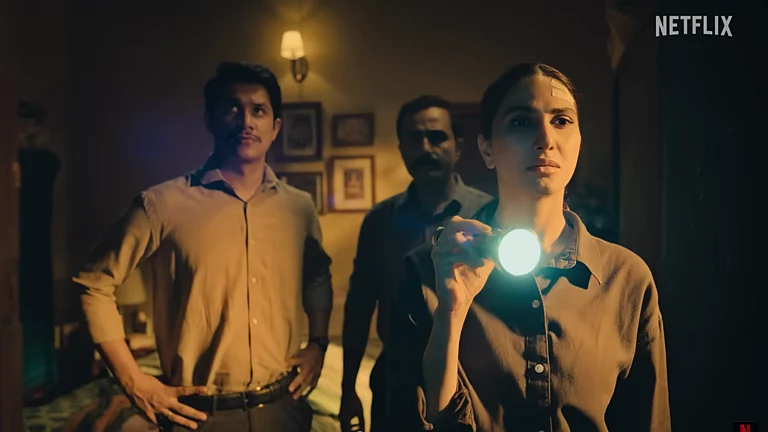Rohan Sippy’s Search: The Naina Murder Case is streaming on JioHotstar.
It is adapted from The Killing (2011), which itself was an adaptation of the 2007 Danish Forbrydelsen.
The show is a procedural about the murder of a teenage girl with Konkana Sen Sharma in the lead role of ACP Sanyukta Das.
Search: The Naina Murder Case Review | A Faithful Adaptation That Forgets What Made The Original Haunting
The show, streaming on JioHotstar, is a missed opportunity. It had the chance to say something about the perils of being a girl in modern India; instead, it settles for the safe familiarity of a procedural chase.
When The Killing premiered in 2011 (adapted from the 2007 Danish Forbrydelsen), it was not your routine police procedural or murder mystery. It was atmospheric and delivered a slow burn through its first two seasons. The show lingered in the rot left behind by death: in families, in institutions, in the people sworn to deliver justice. Every cigarette, every rain-soaked corner, every long pause felt like part of a ritual of grief.
Rohan Sippy’s Search: The Naina Murder Case, the latest adaptation, tries to transplant that structure into an Indian context, and for the most part, it stays faithful to its Nordic source material. But in the process, it loses the soul of what made The Killing so haunting. It updates the setting, sprinkles in some contemporary anxieties—deepfakes, social media, revenge porn—but never quite turns them into a coherent critique. What remains is a serviceable whodunnit, stretched thin across six episodes, more invested in its mystery than its meaning.

The show opens with ACP Sanyukta Das (Konkona Sen Sharma), a consummate cop who’s finally decided to choose family over work. She’s leaving Mumbai’s Crime Cell for a quieter life in Ahmedabad with her husband, hoping to rebuild a strained marriage and give her teenage daughter Mahi (Pari Tonk) some semblance of stability. But fate has other plans. On her last day, the body of 18-year-old Naina Marathe (Chandsi Kataria), an academically brilliant student, is found stuffed in the boot of a car submerged in a waterbody. The car belongs to the campaign fleet of Tushar Surve (Shiv Panditt), a youth politician whose election platform ironically revolves around women’s safety.
What begins as a procedural courtesy quickly becomes an obligation. Sanyukta’s replacement, the impulsive rookie Jai Kanwal (Surya Sharma), is eager to prove himself but lacks her precision. The two clash over methods and motives, their dynamic meant to mirror the generational shift in policing. Jai’s constant conjectures (“what kind of frustration would lead a man to do this?”) repeatedly fall flat, and Sanyukta’s steady competence feels muted rather than magnetic.

Parallel to the investigation runs the grief of Naina’s parents, Uddhav (Sagar Deshmukh) and Payal (Iravati Harshe), who stagger under the weight of loss. Their scenes almost come as an afterthought to the rest of the procedural and it is a reminder that the original show’s true power lay in showing how crime hollowed out ordinary lives.
Search keeps sprinting from one red herring to another: a spurned lover, a teacher with boundary issues, a classmate with secrets, a family friend with ulterior motives. The procedural rhythm feels almost nostalgic, like something out of mid-2000s television. The series never really gets to build a sense of moral unease or dread. Instead of atmosphere, we get exposition.

Thematically, the show gestures at big questions: how unsafe India remains for women, how predators exist in every sphere—from families to friends to strangers. But these ideas hover on the surface. Even the more contemporary flourishes—Naina’s secret phones, her secretive social media presence, the threat of deepfakes—seem grafted on rather than organically explored.
There is, however, one striking subplot involving Sanyukta’s daughter, Mahi. When Sanyukta finds a folder of selfies on her laptop, she assumes Mahi is being groomed or blackmailed. But Mahi insists they’re for herself, a way to celebrate her body, to practice self-love. When Sanyukta warns her about predators online, Mahi turns the conversation around: isn’t the very act of constant surveillance—of mothers policing daughters, of society restricting women “for their own safety”—a form of the same patriarchal control that fuels rape culture? It’s one of the few moments where Search pierces through its procedural shell to say something meaningful about the ecosystem of fear women are made to inhabit. But even this thread is abandoned as the show barrels toward its non-ending.

And that’s perhaps the biggest frustration with Search. Like Forbrydelsen, it ends unresolved, setting the stage for a second season. In theory, this is a bold narrative choice for the contemporary times, when no one wants to invest in a show that might not get renewed. The Killing earned that ambiguity by making its viewers feel the spiritual fatigue of everyone involved. Search, on the other hand, feels unfinished rather than open-ended.
There is also an issue with the tone. The first episode strikes a surprisingly light note—some banter between cops, a bit of office ribbing. But as the series progresses, the darkness never quite descends the way it should. The atmosphere stays tepid. There’s no equivalent of The Killing’s rain-drenched melancholy, no oppressive sense of moral decay. The show feels more like a reconstruction than a reinvention.
To its credit, Search isn’t a disaster. It’s above average television. But it lacks the bite, the texture, the stillness that great crime dramas today require.
In the end, Search faithfully reproduces the structure of the original—the intersecting timelines, the political undertones, the maternal detective torn between work and home—but misses the emotional and cultural specificity that made the original so resonant. The Danish series emerged from a society wrestling with its own complacency, using the murder of a young girl to expose cracks in its supposedly progressive veneer. Search never manages to hold up the same mirror to India.
The show knows that the world is unsafe for girls—but it doesn’t know how to dramatise that truth in a way that feels new or urgent. It flirts with feminist commentary, then retreats into formula. Maybe season two will find the courage to go deeper. But for now, Search remains exactly what it shouldn’t have been: routine.

